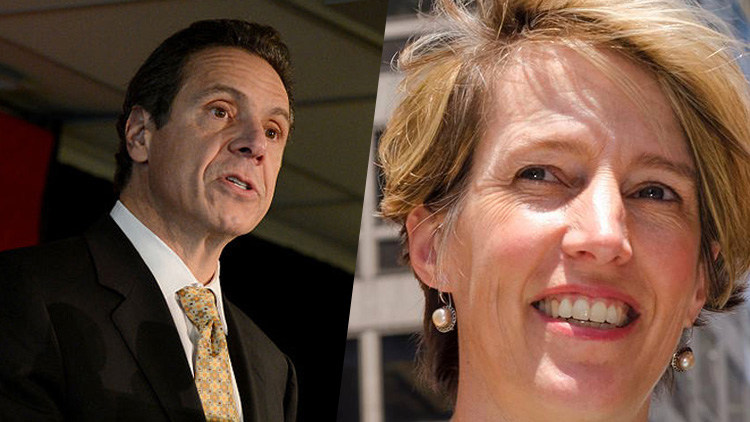Democratic primary voters will weigh in Tuesday on whether they want Gov. Andrew Cuomo or Fordham law professor Zephyr Teachout to be on their party’s ballot in the gubernatorial general election in November.
They’ll also have a chance to choose whether the lieutenant governor will be Kathy Hochul, a one-term upstate Congresswoman, or Timothy Wu, a Constitutional law professor at Columbia University. Zephyr and Wu have been getting more media attention lately—causing the governor “agita,” as one political pundit put it—but their chances hinge on turnout, and seasoned observers predict that most Democrats will stay home. Also running for the Democratic line is comedian Randy Credico.
“I think [it will be] something just south of 10 percent,” Nassau County Democratic Chairman Jay Jacobs, the former state chairman who predicted a very low turnout, told the Press.
In the supposedly hotly contested 2006 Democratic primary between Nassau County Executive Tom Suozzi and Attorney General Eliot Spitzer, turnout wound up being only 14 percent.
That number is in the ballpark of what Rich Schaffer, the Suffolk Democratic chairman and the Babylon Town supervisor, foresees when all the votes are tallied tonight.
“I would expect between 10 and 15 percent,” said Rich Schaffer, the Suffolk Democratic chairman and the Babylon Town supervisor. “I think both Cuomo and Hochul will win—I don’t know if it’s [going to be] what they will want to win by.”
There are about 5.42 million Democrats who vote in presidential elections but some analysts project that only 600,000 to 700,000 Democrats will likely vote in the primary.
Some political observers have said that if Teachout gets more than 30 percent of the vote, she’ll have scored a moral victory for her reformist cause.
But Gerald Benjamin, distinguished professor of political science at the State University of New York at New Paltz, scoffed at that prognostication.
“There are no moral victories in politics!” he told the Press, adding that he thought the lead up to the primary had “a certain drama about it” but he didn’t expect any surprises.
Schaffer put it more bluntly.
“The threshold is 50 percent plus one! Anything short of that is a loss,” he said.
“I think Wu may do a little bit better, but that’s only because it’s an open seat,” Schaffer continued. “It’s not against the governor who’s got an established name.”
The prospect that Teachout’s running mate might do better than her is plausible, some party officials agree.
“It’s logical because everybody knows Cuomo and nobody knows Teachout,” said Jacobs. “In this case, nobody knows Wu, but nobody knows Hochul. By just that description alone, Wu should do better against Hochul than Teachout will do against Cuomo. Not to say that I expect Wu to win; I don’t.”
But if Wu does defeat Hochul, it would spell defeat for minor parties like the Independence Party and the Working Families Party because their November ballots couldn’t be counted if either name on their ticket were different from the main party line. In other words, if these minor parties were hoping to attract votes for Cuomo and Hochul, and the Democratic Party candidates ended up being Cuomo and Wu, then the third parties would be out of luck because they’d need a minimum of 50,000 votes on their own party lines to maintain their position on future ballots.
As one party leader put it, “they’d all be down the tubes.”
So, in that sense, there could indeed be a lot riding on what Democrats do today if they decide to go to the polls.
































